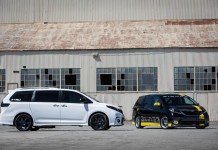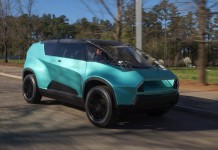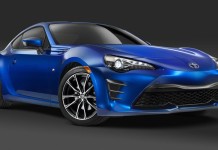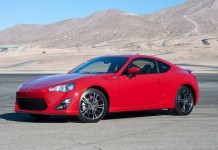The Toyota Camry remains America’s best-selling midsize car, in a segment that has been steadily gaining competitors. Camry is available in four-cylinder and V6 models, and as the Camry Hybrid, equipped with Toyota’s industry-leading Hybrid Synergy Drive.
For 2009 the CE grade is replaced by the Camry grade. The Camry is now available in Camry, LE, SE, and XLE grades.
Performance and Efficiency
In tune with the needs of midsize car buyers, Camry provides excellent fuel economy. Four-cylinder manual and automatic Camry models have city/highway fuel economy ratings of 21/31 MPG, and V6 models have 19/28 MPG EPA-estimated ratings. The Camry Hybrid, which combines a four-cylinder gasoline engine with an electric drive motor, returns an EPA-estimated 33 MPG city/34 MPG highway.
The Camry’s 2.4-liter four-cylinder engine, standard on Camry grade, LE, SE and XLE, puts out 158 SAE horsepower at 6,000 rpm and 161 lb.-ft. peak torque at 4,000 rpm and can be mated to a five-speed manual transmission or an electronically controlled five-speed automatic. (The PZEV-certified version offers 155 hp and 158 lb.-ft.)
The DOHC 3.5-liter V6, available in the LE, SE and XLE grades, delivers a substantial performance boost with 268 horsepower at 6,200 rpm and 248 lb.-ft. peak torque at 4,700 rpm. The chain-driven camshafts employ Dual Variable Valve Timing with intelligence (Dual VVT-i) which controls valve timing on both the intake and exhaust camshafts for optimal performance and efficiency at all engine speeds. The V6 Camry models come equipped exclusively with a six-speed automatic transmission that offers a sequential mode for manual shifting when desired. Intelligent control adapts shifting strategy in response to driver input, with very fast kick-down and noticeable response.
The Camry Hybrid model owes its outstanding efficiency to Hybrid Synergy Drive, which produces a combined 187 horsepower and varies power between the gas engine and electric motor, or combines both, as needed. The first part of Hybrid Synergy Drive consists of a 147-hp, 2.4-liter four-cylinder Atkinson-cycle engine coupled with an electronically controlled planetary-gear continuously variable transmission.
The second part combines a small, high-torque 40-hp electric motor, an ultra-small inverter with a specially designed compact battery, and a transaxle to seamlessly combine power from the electric motor and gasoline engine. Because there are situations in which the gas engine in a Toyota hybrid completely shuts off, air conditioning and power steering systems are driven electrically.
In addition, an “ECO” button limits energy consumption by the climate control system, and under certain conditions can help improve fuel economy. Special attention paid to vehicle underbody aerodynamics, including the use of wheel spats and underbelly pans, helps yield a coefficient of drag of just 0.27, which can benefit fuel economy. The 2009 Camry Hybrid is certified as an Advanced Technology Partial Zero Emissions Vehicle (AT-PZEV), just one of a handful of cars that meets this strict standard. It produces over 70 percent less smog-forming emissions than the average new car.
Handling and Ride
The 2009 Camry offers responsive handling while providing the smooth, quiet ride that sets a benchmark for the segment. Four-wheel independent suspension is via MacPherson struts in front and a dual-link strut rear configuration. Camry, LE, XLE and Hybrid models ride on standard 16-inch wheels of either steel (Camry and LE) or aluminum (XLE and Hybrid), with the sporty SE model featuring standard aluminum six-spoke, 17-inch wheels.
All Camry models are equipped with four-wheel disc brakes. Toyota designed the Camry SE model to spice up the daily commute. Chassis modifications specific to the SE include springs, shock absorbers and bushings with firmer, sportier values than those used in other grades. The Camry SE sits 0.4-inches lower than other Camry models.
Underbody stabilizing braces and a V-shaped brace between the trunk and cabin help to increase the SE’s torsional rigidity. Tuning the SE chassis resulted in optimized underbody aerodynamics. Making the underbody as flat as possible helps to smooth and speed the airflow under the car, and engineers also specially tuned the balance between front and rear downforce.
Safety and Security
The Camry’s body structure is designed to absorb collision-impact forces and help minimize impact deformation to the passenger cabin. High-strength steel is used for B-pillar and rocker panel reinforcements to help manage overall body deformation in the event of certain side collisions. Inside the cabin, the seat frames also are designed to help absorb side collision loads. Dual-stage advanced SRS front airbags, seat-mounted side airbags, side curtain airbags and a driver’s knee airbag are standard on all Camry models. The front seats use Toyota’s Whiplash Injury Lessening (WIL) seat design.
All 2009 Camry models come equipped with a standard anti-lock brake system (ABS), Electronic Brake-force Distribution (EBD) and Brake Assist (BA). The Brake Assist feature is designed to determine if the driver is attempting emergency braking. If the driver has not stepped firmly enough on the brake pedal to engage the anti-lock brake system (ABS), BA supplements the applied braking power until the driver releases pedal pressure. As an available option, Vehicle Stability Control (VSC) with traction control (TRAC) regulates engine output and brake application on individual wheels to help control loss of traction in turns. Camry Hybrid is equipped with the Vehicle Dynamics Integrated Management (VDIM) system that helps manage vehicle traction and stability through throttle control, brake application on individual wheels, and even minor steering correction if circumstances require.
Comfort and Convenience
Camry offers many storage spaces around the front-passenger area, including console side pockets. Storage options also include a large front console box equipped with an accessory power socket and auxiliary audio jack; this box is big enough to store nine CD jewel cases. Other storage areas include an accessory box behind the shift lever containing another power socket, a rear-console box with a card holder and a movable tray, and two large cupholders adjacent to the shift lever.
The four-cylinder Camry XLE model is exclusively equipped with special seat fabric designed to be gentle on the skin. The fabric is treated by the Fraichir™ process, in which it is coated with a naturally occurring component called Sericin that has been extracted and refined from silkworm cocoons. This substance contains a natural moisturizing component.
The Camry’s standard equipment includes air conditioning with micro dust and pollen filter; power windows and door locks; color-keyed power side mirrors; cruise control; halogen headlamps with automatic on/off feature; tilt and telescopic steering wheel; vehicle immobilizer, and a six speaker 160-watt digital AM/FM/CD audio system with auxiliary audio jack. All Camry audio systems can play CDs with MP3 files. The Camry LE adds an in-key remote keyless entry and eight-way-adjustable power driver’s seat.
The Camry XLE’s list of standard features includes an upgraded dual-zone automatic climate control system with steering-wheel controls, plus Plasmacluster™ ionizer technology to help reduce airborne mold spores, microbes, fungi, odors, germs and bacteria inside the passenger cabin. Other XLE features include a premium 440-watt JBL audio system with Bluetooth® technology that allows hands-free calling with compatible phones; wood-style trim; power glass moonroof; reclining rear seats; fog lamps; and aluminum wheels. The V6 Camry XLE is equipped with standard leather-trimmed seats. In the XLE grade, the rear seatbacks can recline eight degrees from their standard position to enhance passenger comfort. Rear-seat passengers also get dedicated personal reading lamps on moonroof-equipped Camry models.
The Camry Hybrid offers a standard equipment level similar to the XLE grade, but adds a standard Smart Entry and Smart Start system. Push-button start allows drivers to lock, unlock, or start the car just by carrying the Smart Key.
Options
Options for select Camry grades include a power tilt/slide moonroof; heated front seats; voice-command DVD navigation system; leather-trimmed seating; rear spoiler, and the Smart Entry and Smart Start system. When the available voice-activated DVD navigation system is added to the Camry (SE, XLE, Hybrid), it is integrated with the premium JBL audio unit and includes a four-disc in-dash CD changer.
Exterior Design
A distinctive, athletic exterior design sets Camry apart in a competitive segment. Camry is built on a 109.3 inch wheelbase to provide outstanding interior room: 101.4 cubic feet of passenger space, with 38.3 inches of rear legroom. The LE grade also features a new wheel finish for 2009.
The Camry SE has a distinctive look with a standard full body kit plus 17-inch aluminum wheels, distinct black, honeycomb-style grille and smoked tint halogen headlamps. Inside, the Camry SE is distinguished by a unique sport-trimmed interior in dark charcoal or ash gray with a leather-wrapped, three-spoke steering wheel and blue-colored Optitron gauges.
Interior Design
The Camry’s roomy interior shows the attention to detail that has helped this model set such high standards for sedan comfort. Controls on the two-level dash and console are easy to see and use. Large instrument panel gauges are easy to see at a glance, and the odometer and trip meters are illuminated at all times to improve visibility. A standard multi-information display provides the outside temperature, estimated range, average speed, average fuel consumption and a trip odometer.
With the 60/40 fold-down rear seats, Camry offers 15 cubic feet of luggage space (14.5 cu. ft. with the reclining rear seat in XLE or fixed rear seat in SE, and 10.6 cu. ft. in the Camry Hybrid). The trunk is equipped with a grocery hook, utility box and luggage net (on XLE) for added convenience.








